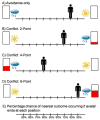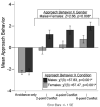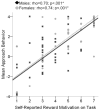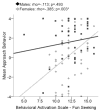A reverse translational approach to quantify approach-avoidance conflict in humans
- PMID: 21843556
- PMCID: PMC3381365
- DOI: 10.1016/j.bbr.2011.08.003
A reverse translational approach to quantify approach-avoidance conflict in humans
Abstract
Animal approach-avoidance conflict paradigms have been used extensively to characterize effects of anxiolytic agents and probe neural circuitry related to anxiety. However, there are few behavioral approaches to measure conflict in human populations, limiting the translation of findings from animal conflict tasks to human clinical research. We developed a novel approach-avoidance conflict (AAC) paradigm involving situations in which the same decision is associated with "reward" (points) and "punishment" (negative affective stimuli). The AAC task was completed by 95 young adults (56 female) with varying levels of self-reported trait anxiety. As expected, conflict-related approach behavior correlated with self-reported motivation to approach reward and avoid punishment and greater reward level increased approach behavior. Additionally, females exhibited less approach behavior than males. Anxiety Sensitivity Index (Physical subscale) scores related negatively to approach behavior for males, while Behavioral Activation Scale (BAS, Fun Seeking subscale) scores related positively to approach behavior for females. Results support the utility of the AAC task as a behavioral test that has strong reverse translational features. Findings indicate that approach drives and anxiety sensitivity may be important in determining conflict behavior for females and males respectively. The approach-avoidance conflict task offers a novel, translational measure to probe neural systems underlying conflict behavior, motivational processes, and anxiety disorders.
Copyright © 2011 Elsevier B.V. All rights reserved.
Figures






References
-
- Schneirla T. An evolutionary and developmental theory of biphasic processes underlying approach and withdrawal. Lincoln: University of Nebraska Press; 1959. - PubMed
-
- Lang PJ, Bradley MM, Cuthbert BN. Emotion, motivation, and anxiety: brain mechanisms and psychophysiology. Biological Psychiatry. 1998;44:1248–63. - PubMed
-
- Gray JA, McNaughton N. The neuropsychology of anxiety: An enquiry into the functions of the septo-hippocampal system. 2. Oxford, England: Oxford University Press; 2000.
-
- Gray JA. A critique of Eysenck’s theory of personality. In: Eysenck HJ, editor. A model for personality. Berlin: Springer; 1981. pp. 246–76.
-
- Millan MJ. The neurobiology and control of anxious states. Progress in Neurobiology. 2003;70:83–244. - PubMed
Publication types
MeSH terms
Grants and funding
LinkOut - more resources
Full Text Sources
Medical
Molecular Biology Databases
Research Materials

